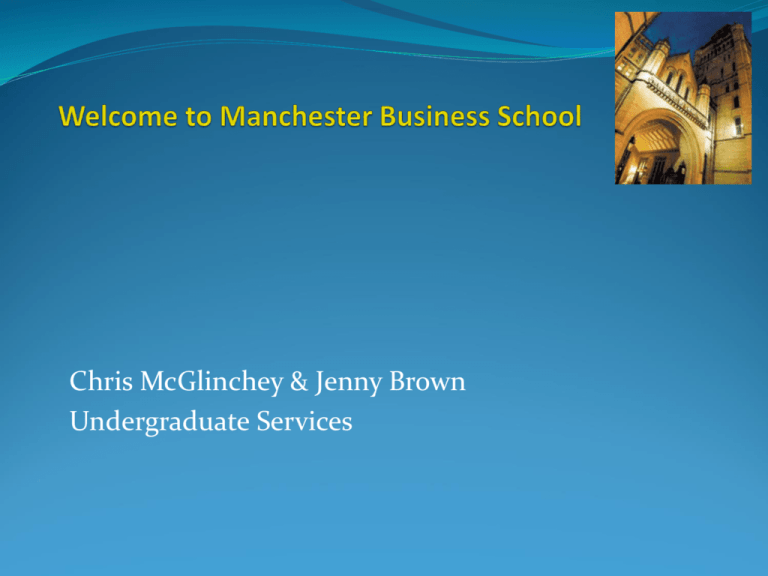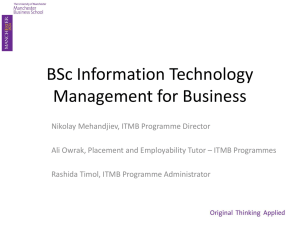BSc in International Management
advertisement

Chris McGlinchey & Jenny Brown Undergraduate Services Congratulations ! Who are Undergraduate Services? Undergraduate Office (D20 MBS East) Email: undergraduate@mbs.ac.uk Assessment and Student Support Centre (D14 MBS East) Email: studentsupport@mbs.ac.uk Your Arrival Pack Teaching Timetables; Health & Safety course information; Undergraduate online handbook; Academic Advisor information. Timetable Your timetable will be different each week. You are responsible for checking your personal timetable on the Student System and making sure that you are in the right place at the right time. H Where to find information My Manchester Student System Online Undergraduate Handbook Blackboard H HM JB Undergraduate Online Handbook: https://ughandbook.portals.mbs.ac.uk/Home.aspx Programme Structure/Learning outcomes Specialism requirements (BSc Management only) Timetables Assessment rules H Role of Blackboard All courses have a space in the Virtual Learning Environment (Blackboard) You must frequently consult the Blackboard space for all of your courses The resources on Blackboard are not a substitute for attending teaching sessions. H IT Information IT Account Register via the Student System Note your University of Manchester email address Storage – p-drive 200mb of space Printing PC labs Student Group Study Room – C11 Wifi – eduroam IT Support – itservices.manchester.ac.uk H Communication from Undergraduate Services e-Bulletin every fortnight emails Texts Online Undergraduate Student Handbook Blackboard Notice boards Plasma screens Twitter/Facebook H Degree weightings First year – need to pass to proceed to second year Marks do not count towards degree classification, but do appear on a transcript of marks. Marks may be important when applying for internships/ work experience Second year – worth one third of your degree mark Final year – worth two thirds of your degree mark H Approaches to teaching and learning University teaching is different from school/ college Some very large lectures Some small group seminars/ workshops A range of teaching styles Lecturers, senior lecturers, professors, graduate teaching assistants (GTAs), seminar leaders You are expected to be an independent learner You are responsible for your own learning H What to expect Some courses are assessed by exam only, some by coursework and exams and some by coursework only It is important that you attend all your classes – lectures, seminars and tutorials Information on Blackboard is not a substitute for teaching in class Ask if you need help – seminar leaders and lecturers can help Don’t be tempted to copy work (plagiarism), buy essays from the internet or cheat in exams – the penalties are severe, even for a first offence… Last year two students found cheating in first year exams had to resit all their exams and had zero marks on their transcripts HM JB H Need extra help with maths? There are extra drop in maths surgeries each semester for students who want more help. Look out for details in the e-Bulletin H Attendance and Engagement You are expected to attend all scheduled teaching session (lectures, seminars, workshops etc) You are expected to engage in all scheduled teaching session (lectures, seminars, workshops etc) You are expected to avoid any behaviour that would interfere with the learning and engagement of others. Seminar attendance will be monitored, and spot checks may be conducted in lectures. H Feedback Academic staff aim to provide feedback which is: Prompt Individual Constructive Related to progression Related to the learning outcomes of the course unit Various formats H Academic Advisors Every student will be assigned an academic advisor An academic advisor is a member of staff who you will get to know over your first year, and who will remain with you throughout your time on the programme. You will meet your academic advisor every fortnight as part of the Academic and Career Development course (BMAN10780)with the exception of BSc Accounting students. Your academic advisor will provide you with: A point of contact regarding academic issues Support in developing a personal development plan (PDP) Feedback on your progress A reference should you need one for a job, internship or further study H Office hours Office hours are times when academic staff are available to meet students Academic staff should display their office hours on their door. J Examination Periods 3 examination periods January May/June August/September Ensure you can be in Manchester during each of these periods Don’t book flights/holidays etc. Resits are for progression only, not a second chance to gain a better mark. Exam information in special e-bulletin J Religious Observance University avoids timetabling formal assessment on religious days or festivals. Casual, social or domestic religious events not accounted for. Every effort made to accommodate legitimate requirements. Examination and Religious Observance Form Student Services Centre. Full policy online here https://portalcms.manchester.ac.uk/crucial-guide/academic-life/exams/timetable/religious-observance/ J Assessment and Student Support Centre Advice, guidance and support Mitigating circumstances Coursework extensions Absence from class Assessment queries Progression rules Referral MBS East room D14 Opening hours: 9am – 4pm / plus out of office hours appointments J Assessment and Student Support Centre Referral centre Academic Advisors Peer Mentors Student Handbook International society International Advice Team, visa queries Halls of Residence Accommodation Office Disability Support Office Counselling service Careers service Student Services Centre administration, registration, swipe cards, tuition fees, loans Occupational Health J Mitigating Circumstances Circumstances beyond your control which adversely affect assessment Complete a form at the earliest opportunity and submit to Assessment and Student Support Centre Provide documentary evidence Support is available J Register with a Doctor In Manchester At earliest opportunity Signing up for a local GP is easy. The NHS website can tell you where your nearest one is and if they are taking on new patients. J Register with the Police International Students Register within 7 days of arrival Carry your police registration certificate with you at all times J English Language Support for International Students University Language Centre run classes: writing, speaking, grammar, pronunciation. To qualify you must take an online English Language Proficiency Test. Results and recommendations for language support available at the end of the test. Classes start 6th October-12th December 2014 and run again in semester 2 Academic writing tutorial service All information available at ULC website: www.ulc.manchester.ac.uk J Disability Support Office (DSO) Provides a confidential service to support disabled students (approx. 4000 a year) with issues such as: specific learning difficulties, mental health difficulties, medical conditions, deaf and hard of hearing students, blind and partially sighted students, students with autism/Asperger syndrome. Location: University Place J Student Services Centre (SSC) The Student Services Centre provides a wide range of services related to: registration, fee payment, immigration, examinations, scholarships and bursaries, official documentation, certificates and transcripts. Location: Burlington Street J Prizes MBS award prizes for the best performing students on each programme. More information available from the online undergraduate handbook J During Welcome week you can spot AskMe ambassadors around campus wearing purple AskMe t-shirts and hoodies; they will be able to help you with any questions you might have on a range of topics. J Good luck & keep in touch HM JB



